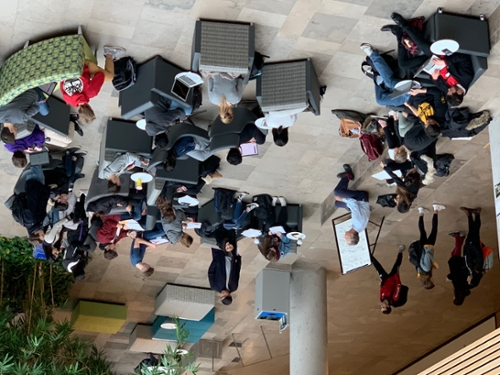We use cookies on this site to enhance your experience.
By selecting “Accept” and continuing to use this website, you consent to the use of cookies.
Search for academic programs, residence, tours and events and more.
By Suzanne Bowness | Nov. 21, 2023
Economics can be a gateway to successful careers in data analytics, policy making, finance, and other fields. The Bachelor of Arts in Economics at the Lazaridis School of Business and Economics offers solid training in topics such as microeconomics, macroeconomics, and statistics, all of which add up to a strong grounding for the future.
For those who are interested in adding another field to their skill set, the Lazaridis School stands out with its addition of three combination programs to the degree, including accounting, finance, and data analytics. According to program coordinator Justin Smith, as soon as the program added these options to direct applications, students started immediately applying to them. “The second we listed those programs separately, we saw a big increase—students were revealing their demand for these options.”
Fourth-year student Alexander Bond was one of those applicants - attracted by the possibility of majoring in both economics and finance as a way of pursuing his interests in investment management. Connecting with the program through an open house, he also admired the close-knit community described by current students. Now that he is about to graduate, Bond says the program delivered what he expected and more, both in terms of technical skills and also softer skills like time management and even storytelling. “One skill that’s so in demand today is the ability to tell stories especially with numbers,” he says.
Through the course of the economics program, students also enjoy many opportunities to connect and get involved with the program. The student-run Economics Club organizes study events like mock midterms as well as social events. Bond says he’s enjoyed attending several of these, as well as being a student mentor with the Economics Club, where he’s helped a fellow finance student in first year navigate the program and built a strong relationship in return.
The club also facilitates mingling with faculty, a great way for students to get to know their professors on a different level. A professor debate challenge assigns various topics to professors to debate, for example the merits of cryptocurrency or the policy behind the carbon tax. Annual trivia nights also combine student and professor teams. Smith is an enthusiastic faculty participant in these events and especially impressed that they are student led. “Attending these Economics Club events breaks down the hierarchy; Often students are afraid to approach instructors, so it’s good to mix with them on a non-stressful basis.”
The Economics program also offers opportunities to celebrate student achievement. Faculty recently started a competition to engage all economics students in predicting economic outcomes, for example this year’s focus is on immigration levels by municipality. The competition is in the style of the Kaggle Data Science Competition, with merchandise and even cash prizes adding a bit of extra incentive for the teams. Students also compete with other universities in the Bank of Canada Governor’s Challenge finals, where Laurier is often a finalist and two-time winner.
Yet another opportunity arises at the end of each term, where students are invited to submit their work for best paper awards, an initiative that Smith says has proven popular. “Students like the idea of being recognized beyond just a mark in class.” Bond, who won an award, confirms that it was very motivating. “I wasn't always a good student, especially in first year, so it was a huge change in how I looked at academics because to have my efforts accredited by faculty was a big confidence booster,” he said. Bond has gone on to publish papers, and also says his win gave him the confidence to start connecting with more of his professors.

To connect with the work world, economics students have the opportunity to apply for a co-op placement at the end of first year that starts in the summer after second year and sees students work alternate terms until they graduate for a total of 12 months of co-op. Students tend to try out different workplaces for each four-month term, and economics students tend to choose placements such as banks, insurance companies and government, which are fields where many grads pursue their careers. Even students who don’t get into the competitive co-op stream can still seek out work opportunities, which Bond did three times through the program, completing internships in sales, insurance and most recently investment management. He even has an investment internship set up for when he graduates.
As program coordinator, Smith says fourth year is the point where professors really get to marvel at the culmination of students training and see how far they have come. That’s when all students take their capstone course, a supervised independent study where they focus on writing a paper on a topic of their choice. Paper assignments allow students to follow their interests, so topics are wide-ranging. One recent paper looked at whether having one superstar player on a sports team could increase the odds that team would win. Another examined the impact of transition to daylight savings time on motor vehicle collisions.
Smith says he’s constantly impressed by the rigour of the research and quality of the papers. “The fun part for me is at the end seeing these research papers using four years of skills to product what is almost always an interesting research paper,” he says.
As for Bond, at the cusp of graduation he feels ready to take on his next internship and beyond. “This program helps you develop the skills demanded by today's workforce, in economics and finance, you go in-depth with theory and then follow up with the applied side of things. I've used knowledge from my program in my internship placements, and I definitely feel prepared for the workforce.”